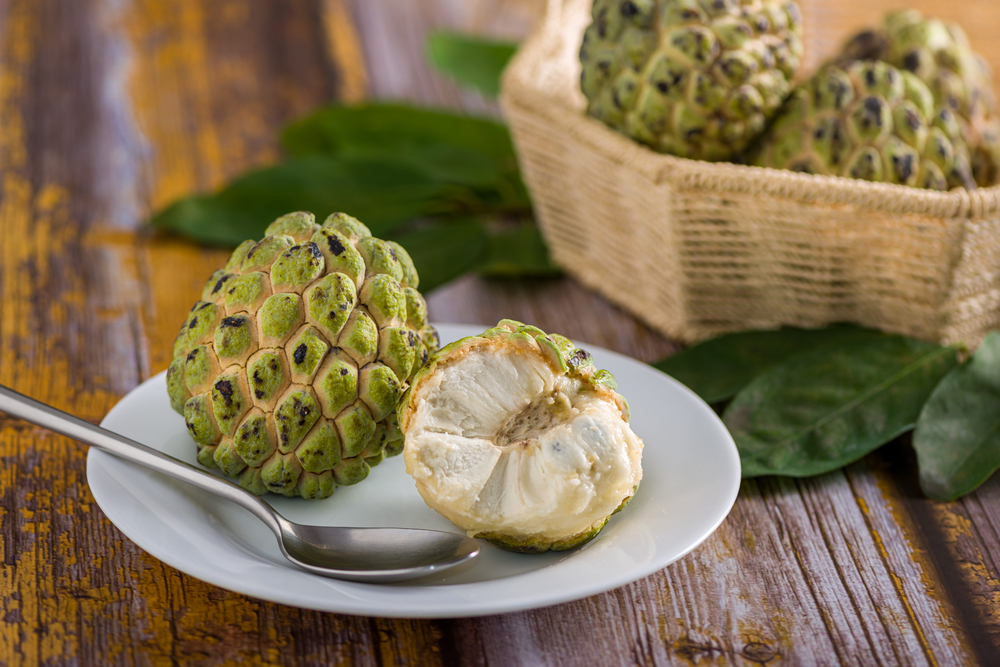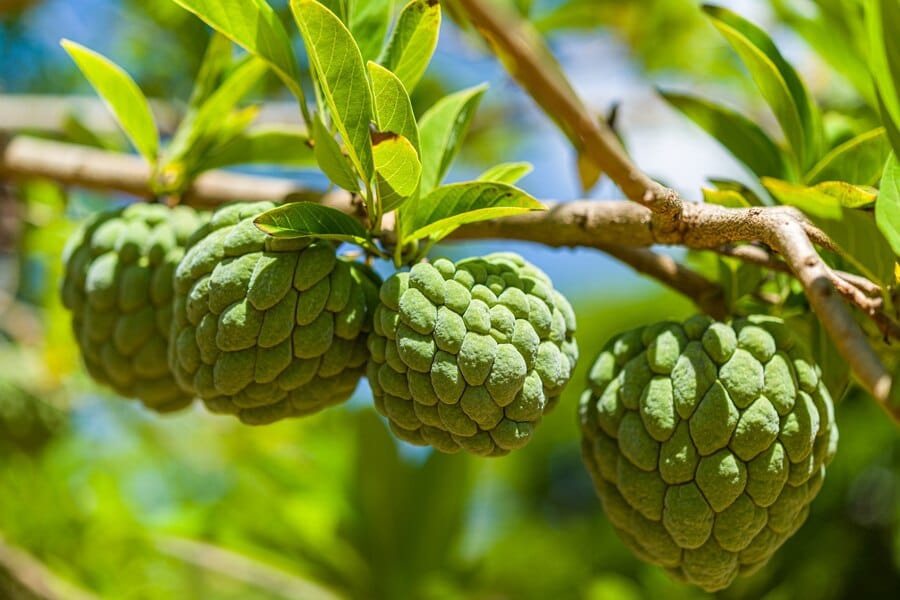Greetings, fellow fruit enthusiasts and curious minds! Today, we embark on a delectable journey exploring the sweet marvel that is custard apple, known as ‘Sitaphal’ fruit in India. They are scientifically known as Annona squamosa or sugar apples. Custard apples have a rich history, originating in the tropical regions of South America and spreading their delicious influence across the globe. These green, heart-shaped fruits are not only visually appealing but also boast a unique flavor profile that combines the sweetness of mangoes with the creaminess of bananas.
In a world of culinary delights, Sitaphal stands out, not just for their distinct flavor but for the trove of Sitaphal benefits. Join us as we peel the layers of this fruit, exploring recipes that turn this tropical treasure into ambrosial delights. But our journey doesn't stop there; we'll delve into the nutritional richness and custard apple benefits they offer than meets the eye.
Nutritional Value of Custard Apple
Let's delve deeper into the breakdown of custard apple nutrition per 100 grams:
Energy (101 kcal):
Custard apples provide a moderate energy content, making them a satisfying and nutritious snack option.
Total Fats (0.6 g):
The low fat content in custard apples makes them a heart-healthy choice. The saturated fat, polyunsaturated fat, and monounsaturated fat components are all minimal, aligning with a balanced diet.
Protein (1.7 g):
While not a significant source of protein, custard apples contribute to your daily intake, supporting muscle health and various bodily functions.
Carbohydrate (25.2 g):
Custard apples are a carbohydrate-rich fruit, with a substantial portion coming from natural sugars (20.8 g). This makes them a sweet and wholesome alternative to processed sugars.
Dietary Fiber (2.4 g):
The dietary fiber content aids in digestion, promoting regular bowel movements and contributing to overall gut health.
Calcium (30 mg):
Sitaphal fruit contains a small amount of calcium, contributing to the maintenance of strong and healthy bones.
Potassium (382 mg):
With a notable potassium content, custard apples are beneficial for maintaining optimal blood pressure levels and supporting cardiovascular health.
Phosphorus (21 mg):
Phosphorus, an essential mineral, is present in custard apples, contributing to the formation and maintenance of healthy bones and teeth.
Iron (0.71 mg):
The iron content in custard apples is essential for the formation of red blood cells, facilitating the transport of oxygen throughout the body.
Magnesium (18 mg):
Contributing to muscle and nerve function, magnesium in custard apples supports various physiological processes.
Sodium (4 mg):
Custard apples have a low sodium content, making them suitable for individuals watching their sodium intake for heart health.
Vitamin C (19.2 mg):
A rich source of vitamin C, custard apples boost the immune system, promote collagen formation, and act as a potent antioxidant.
Vitamin B6 (0.221 mg):
Vitamin B6, present in custard apples, plays a role in brain development and function.
Niacin (Vitamin B3) (0.5 mg):
Niacin contributes to the conversion of food into energy and helps maintain skin health.
Riboflavin (Vitamin B2) (0.1 mg):
Riboflavin is involved in energy production, and custard apples provide a portion of the daily recommended intake.
Thiamin (Vitamin B1) (0.08 mg):
Essential for carbohydrate metabolism and nervous system function, thiamin is found in custard apples.
Fatty Acids (0.231 mg):
Omega-3 and omega-6 fatty acids, though in small amounts, contribute to the overall nutritional profile of custard apples.
Vitamin A (33 IU):
Custard apples contain vitamin A, which is crucial for vision, immune function, and skin health.
Incorporating Sitaphal into your diet provides a diverse range of essential nutrients, making them a wholesome and nutritious addition to your overall eating plan.

Health Benefits of Custard Apple
Immunity Boost with Vitamin C:
Custard apples are packed with vitamin C, a powerful antioxidant, and other compounds that support a healthy immune system. Antioxidants help neutralize free radicals in the body, reducing oxidative stress and supporting overall cellular health. This may contribute to a lower risk of chronic diseases. Vitamin C enhances the production of white blood cells and antibodies, which helps ward off infections and keep you feeling your best.
Boosts Your Mood:
The presence of vitamins, particularly B vitamins like B6 and niacin, in custard apples can contribute to mood regulation. These vitamins play a role in neurotransmitter synthesis, potentially influencing mood and emotional well-being.
Rich in Dietary Fiber:
For those looking to maintain a healthy digestive system, custard apples are a natural source of dietary fiber. Fiber adds bulk to the stool, preventing constipation and supporting a healthy digestive system. It promotes regular bowel movements and aids in overall gut health.
Potassium Powerhouse:
The potassium content in custard apples makes them an excellent choice for maintaining healthy blood pressure levels. Potassium helps regulate blood pressure by balancing the effects of sodium. Adequate potassium intake is associated with a lower risk of hypertension, promoting cardiovascular health.
May Benefit Eye Health:
Custard apples contain vitamin A, a crucial nutrient for maintaining healthy vision. Vitamin A is essential for the proper functioning of the retina and may help prevent age-related macular degeneration (AMD) and other eye disorders.
May Have Anticancer Properties:
Some studies suggest that custard apples may possess compounds with potential anticancer properties. These compounds, such as annonaceous acetogenins, have shown promising results in inhibiting the growth of cancer cells in laboratory studies.
May Fight Inflammation:
Custard apples contain antioxidants and anti-inflammatory compounds that may help reduce inflammation in the body. Chronic inflammation is linked to various health issues, including cardiovascular diseases and autoimmune disorders.
Kaurenoic acid is a bioactive compound found in custard apples known for its anti-inflammatory properties. It also contains catechin and epicatechin, which belong to the flavonoid group of antioxidants. These compounds have been shown to inhibit certain inflammatory pathways and enzymes involved in the inflammatory process. By doing so, these antioxidants may help mitigate inflammation and contribute to overall health.
How to Choose and Store Custard Apples
Selecting the Perfect Sitaphal Fruit:
When picking Sitaphal fruit, look for ones with a slightly bumpy skin and a uniform green color. A gentle press should reveal a subtle give, indicating optimal ripeness.
Storing Tips:
To ensure maximum freshness, store Sitaphal fruit in a cool, dry place. If they're not fully ripe when purchased, allow them to ripen at room temperature, then refrigerate for an extended shelf life.
How to Enjoy Custard Apple
Fresh Consumption:
Scoop out the creamy flesh with a spoon and relish its natural sweetness.
Custard Apple Sorbet:
Freeze custard apple pulp with a touch of lime juice for a guilt-free, homemade sorbet. Perfect for a hot summer day!
Sweet Dishes:
Incorporate custard apple into traditional sweet dishes like firni, rabdi, or kheer. The creamy texture and sweet flavor of custard apple can add a delightful twist to these desserts.
Ice Creams, Juices, and Milkshakes:
Blend custard apples into ice creams, juices, or milkshakes for a refreshing and indulgent treat. The unique taste of custard apple pairs well with dairy products. Blend custard apple, banana, and Greek yogurt for a refreshing and nutritious smoothie bowl. Top with granola and sliced almonds for added crunch.

Cosmetic Uses:
Custard apple is known for its antioxidant properties, which may contribute to skin protection. You can use custard apple extracts or pulp in DIY face masks or creams to potentially benefit your skin.
Hair Growth:
The seed oil extract of custard apple is believed to have properties that may support hair growth. It can be used in hair masks or applied directly to the scalp.
Topical Applications:
Create a paste from different parts of custard apple, such as leaves or flesh, and apply it topically to wounds, bruises, or boils. The natural compounds in custard apples may have soothing and healing properties.
Laxative:
Custard apple is known for its mild laxative properties. Consuming custard apple or its pulp may help manage constipation and promote regular bowel movements.
Potential Custard Apple Side Effects
While there are a range of custard apple benefits, it's important to be aware of custard apple side effects. Here are some considerations:
Allergic Reactions:
Some individuals may be allergic to custard apples. Allergic reactions can range from mild symptoms like itching and skin rashes to more severe reactions such as swelling of the face and difficulty breathing. If you experience any allergic symptoms, seek medical attention promptly.
High Sugar Content:
Custard apples are naturally sweet and contain natural sugars. Individuals with diabetes or those trying to manage their blood sugar levels should consume custard apples in moderation and be mindful of their overall carbohydrate intake.
Gastrointestinal Issues:
Excessive consumption of custard apples may lead to gastrointestinal discomfort in some individuals. This could include symptoms such as bloating, gas, or diarrhea. Moderation is key, especially for those with sensitive digestive systems.
Interactions with Medications:
Individuals taking medications or undergoing treatments should be cautious. Custard apples may interact with certain medications or treatments. For example, if you are on blood pressure medication, the potassium content in custard apples may affect your potassium levels.
Pregnancy and Breastfeeding:
Pregnant and breastfeeding women should consume custard apples in moderation as part of a balanced diet.
The Final Verdict
In conclusion, custard apple transcends its role as a delicious tropical fruit; it emerges as a nutritional powerhouse with a rich history in traditional medicine. The amalgamation of all above insights paints a vivid picture of custard apple's versatility and custard apple benefits. So, whether you're a connoisseur of exotic fruits or on a quest for wholesome nutrition, custard apple deserves a prominent spot in your dietary repertoire. Buy custard apples online at edobo and embrace its exotic elegance and savor the goodness it brings to your table!


0 Comment